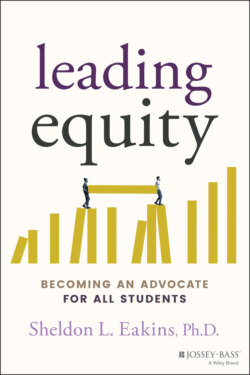Читать книгу Leading Equity - Sheldon L. Eakins - Страница 10
What Are Your Motives?
ОглавлениеI did a training with a group of teacher candidates a while ago. A good professor colleague of mine invited me to lead the training, and he asked me talk about equity in education. After providing my lecture, I opened the floor for some Q&A. I love to do Q&A because when I prepare a lesson for some group with whom I'm going to work, I assume that I'm delivering information and engagement based off what is needed. I love to follow up with Q&A because maybe I missed something or maybe I didn't touch on a question or a topic that an individual in the audience might have had.
A young white woman raised her hand. She said, “I am finishing up my teacher program soon, and I am very into equity work. I want to be the best teacher I can be and be there for my students. Should I go to an urban school, or should I go to a suburban school?” I remember responding with, “I can't answer that question. What are your motives? I don't know you. I know nothing about you. I don't know if you are saying, ‘I feel like I can do good at an urban school, teach kids, and help provide a voice and advocacy work. Should I go to a suburban school, provide a voice, and teach our students in those schools about social justice.'” I went on to say, “The bottom line is, be your authentic self. Kids can tell when someone is putting on a show. Kids can tell when someone's motives aren't genuine. Just because you're an educator does not mean that your students, parents, guardians, and community know that you have the best intentions. You can say that in your opening welcome letter. You can say that in your weekly newsletters, but are you showing that through your actions? Whether you decide to work in a school that's primarily Black and Brown or at a primarily white school, I think at the end of the day, we're doing our kids a disservice if our intentions aren't genuine. Are you coming to a school because you feel like you need to save that community? Are you coming to the school because it's just another paycheck for you? Are you coming because you recognize that for our educational system to change and for us to develop future good citizens, we must respect each other and respect our different opinions? We must learn to help others. We need you to be there to support students in that manner and teach them those other life skills and prepare them for life outside your classroom.”
I don't believe in the phrase “preparing students for the real world” because school is the real world as well. However, preparing them with the skills they need to operate as adults is not indoctrination. It's just teaching your kids to be good people and good human beings. What are your motives?
Unfortunately, I sometimes get to the place of trying to figure out what's next. We live in a world, especially if you're in the United States, where the media dictates a lot of our beliefs. I have a newscaster friend who once told me the way the media selects stories. The mantra was, “If it bleeds, it leads.” It often takes a tragedy for folks to start to listen. We support various causes for whatever reason, but I always wonder sometimes if there is more that I can do as Sheldon Eakins? Did I do enough? Can I do more? Are there topics on my podcast that I haven't covered that I need to cover? Are there topics that I should cover more? I question myself a lot because as I say on my Leading Equity Podcast every time, “Welcome advocates.” I talk about being an advocate. I say it in my newsletters. I talk about advocacy, but sometimes I wonder, am I doing enough?
I believe that if I were to say that I'm an ally, I feel like that's a self-proclaimed title. I don't know a lot of people who call each other allies; maybe it's my circles that I hang around, but I don't know a lot of people who say, “Oh yeah, that individual is an ally.” I hear many people say that they are an ally to someone else. They give themselves that title, but if I were to ask one of their students or if I asked a parent who knows them or a colleague who knows them, what would their response be? Would they say, “Yeah, I believe that this person is an ally.” Then, I guess it also depends on the answer to the question, “Is that person okay with just being a safe space?” My good friend, Ken Shelton, always says, “Safe for who?”
